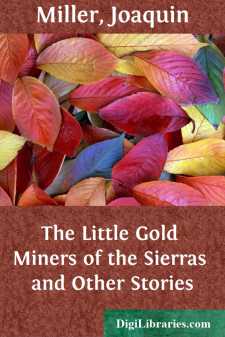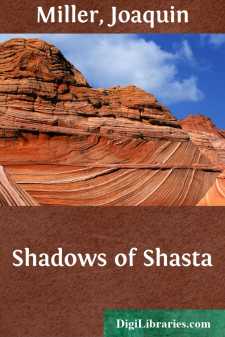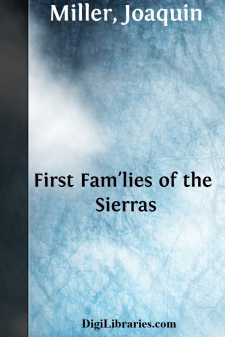Categories
- Antiques & Collectibles 13
- Architecture 36
- Art 48
- Bibles 22
- Biography & Autobiography 813
- Body, Mind & Spirit 142
- Business & Economics 28
- Children's Books 17
- Children's Fiction 14
- Computers 4
- Cooking 94
- Crafts & Hobbies 4
- Drama 346
- Education 46
- Family & Relationships 57
- Fiction 11829
- Games 19
- Gardening 17
- Health & Fitness 34
- History 1377
- House & Home 1
- Humor 147
- Juvenile Fiction 1873
- Juvenile Nonfiction 202
- Language Arts & Disciplines 88
- Law 16
- Literary Collections 686
- Literary Criticism 179
- Mathematics 13
- Medical 41
- Music 40
- Nature 179
- Non-Classifiable 1768
- Performing Arts 7
- Periodicals 1453
- Philosophy 64
- Photography 2
- Poetry 896
- Political Science 203
- Psychology 42
- Reference 154
- Religion 513
- Science 126
- Self-Help 84
- Social Science 81
- Sports & Recreation 34
- Study Aids 3
- Technology & Engineering 59
- Transportation 23
- Travel 463
- True Crime 29
The Little Gold Miners of the Sierras and Other Stories
by: Joaquin Miller
Categories:
Description:
Excerpt
THE LITTLE GOLD MINERS OF THE SIERRAS.
Their mother had died crossing the plains, and their father had had a leg broken by a wagon wheel passing over it as they descended the Sierras, and he was for a long time after reaching the mines miserable, lame and poor.
The eldest boy, Jim Keene, as I remember him, was a bright little fellow, but wild as an Indian and full of mischief. The next eldest child, Madge, was a girl of ten, her father's favorite, and she was wild enough too. The youngest was Stumps. Poor, timid, starved Little Stumps! I never knew his real name. But he was the baby, and hardly yet out of petticoats. And he was very short in the legs, very short in the body, very short in the arms and neck; and so he was called Stumps because he looked it. In fact he seemed to have stopped growing entirely. Oh, you don't know how hard the old Plains were on everybody, when we crossed them in ox-wagons, and it took more than half a year to make the journey. The little children, those that did not die, turned brown like the Indians, in that long, dreadful journey of seven months, and stopped growing for a time.
For the first month or two after reaching the Sierras, old Mr. Keene limped about among the mines trying to learn the mystery of finding gold, and the art of digging. But at last, having grown strong enough, he went to work for wages, to get bread for his half-wild little ones, for they were destitute indeed.
Things seemed to move on well, then. Madge cooked the simple meals, and Little Stumps clung to her dress with his little pinched brown hand wherever she went, while Jim whooped it over the hills and chased jack-rabbits as if he were a greyhound. He would climb trees, too, like a squirrel. And, oh!—it was deplorable—but how he could swear!
At length some of the miners, seeing the boy must come to some bad end if not taken care of, put their heads and their pockets together and sent the children to school. This school was a mile away over the beautiful brown hills, a long, pleasant walk under the green California oaks.
Well, Jim would take the little tin dinner bucket, and his slate, and all their books under his arm and go booming ahead about half a mile in advance, while Madge with brown Little Stumps clinging to her side like a burr, would come stepping along the trail under the oak-trees as fast as she could after him.
But if a jack-rabbit, or a deer, or a fox crossed Jim's path, no matter how late it was, or how the teacher had threatened him, he would drop books, lunch, slate and all, and spitting on his hands and rolling up his sleeves, would bound away after it, yelling like a wild Indian. And some days, so fascinating was the chase, Jim did not appear at the schoolhouse at all; and of course Madge and Stumps played truant too. Sometimes a week together would pass and the Keene children would not be seen at the schoolhouse. Visits from the schoolmaster produced no lasting effect. The children would come for a day or two, then be seen no more. The schoolmaster and their father at last had a serious talk about the matter.
"What can I do with him?" said Mr. Keene.
"You'll have to put him to work," said the schoolmaster. "Set him to hunting nuggets instead of bird's-nests. I guess what the boy wants is some honest means of using his strength. He's a good boy, Mr. Keene; don't despair of him. Jim would be proud to be an 'honest miner.' Jim's a good boy, Mr. Keene."
"Well, then, thank you, Schoolmaster," said Mr. Keene. "Jim's a good boy; and Madge is good, Mr. Schoolmaster; and poor starved and stunted motherless Little Stumps, he is good as gold, Mr. Schoolmaster. And I want to be a mother to 'em—I want to be father and mother to 'em all, Mr. Schoolmaster. And I'll follow your advice. I'll put 'em all to work a-huntin' for gold."
The next day away up on the hillside under a pleasant oak, where the air was sweet and cool, and the ground soft and dotted over with flowers, the tender-hearted old man that wanted to be "father and mother both," "located" a claim....




